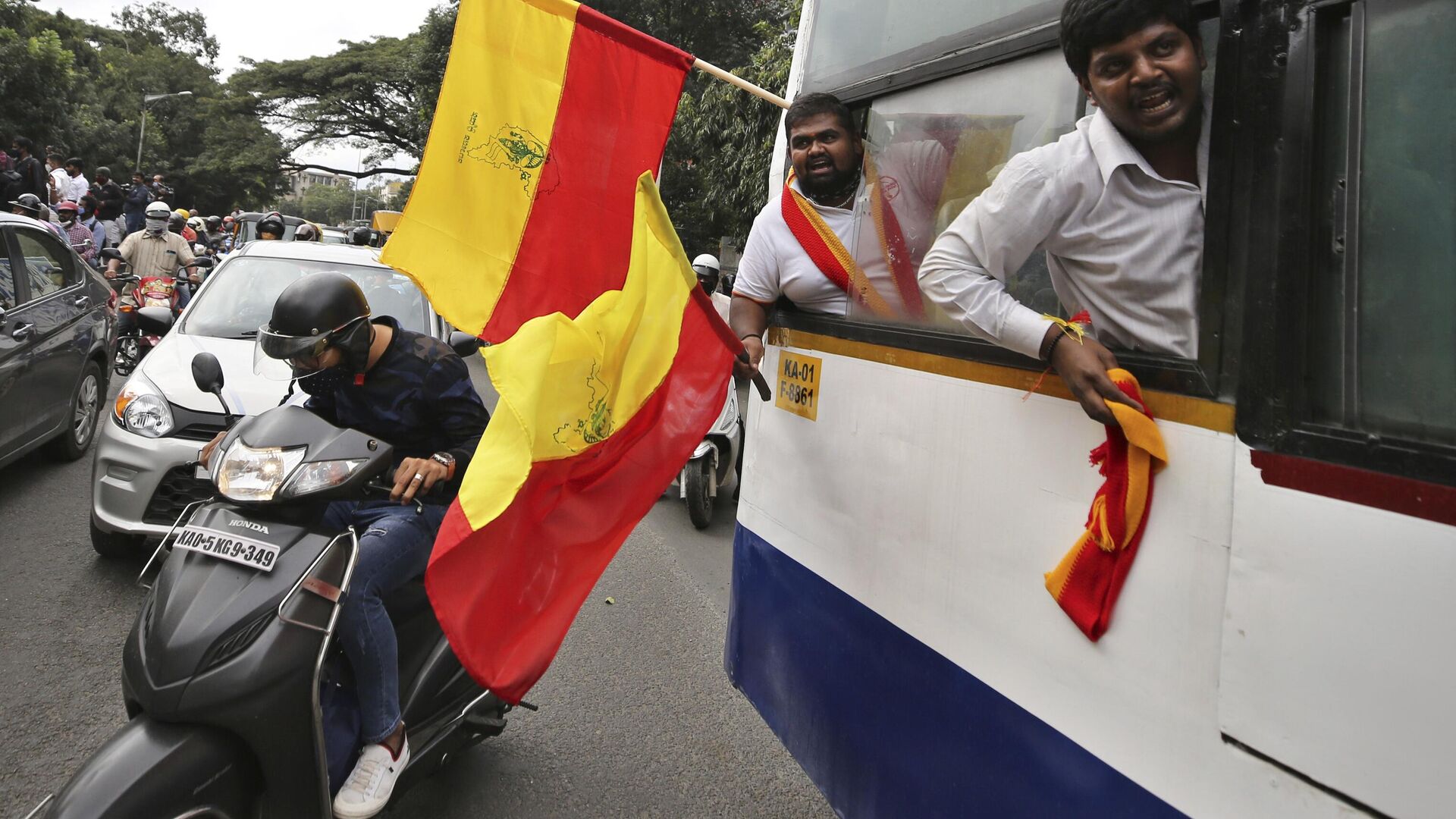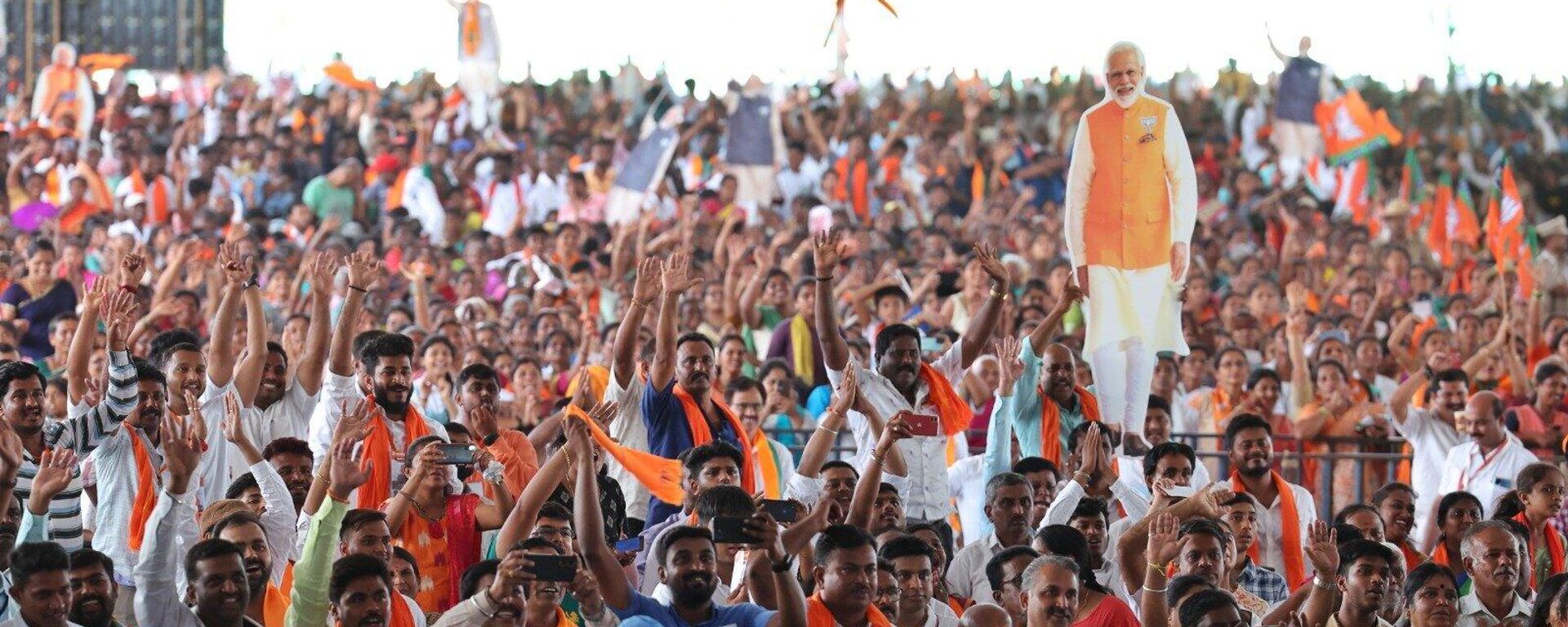https://sputniknews.in/20231102/unpacking-long-political-tussle-of-marathas-reservation-5190459.html
Unpacking Marathas Reservation's Long Political Tussle
Unpacking Marathas Reservation's Long Political Tussle
Sputnik India
Marathas community has been demanding for reservation in education and government employment due to the worsening financial stability of the community in Maharashtra.
2023-11-02T11:30+0530
2023-11-02T11:30+0530
2023-11-02T15:30+0530
maharashtra
india
bharatiya janata party (bjp)
shiv sena
political controversy
political crisis
indian national congress (inc)
indian farmers
dalits
other backward class (obc)
https://cdn1.img.sputniknews.in/img/07e7/0b/01/5194446_0:167:3047:1881_1920x0_80_0_0_81073b3e4ce8825f2c8d523460fb5ee0.jpg
All prominent political parties in Maharashtra, ruling parties as well as opposition, on Wednesday agreed that the Maratha community in the state needs quotas and urged pro-quota activist Manoj Jarange Patil to call off his indefinite fast and come back into action.The unwavering farmer-activist and Maratha leader, Manoj Jarange-Patil, has been persistently engaging in a hunger strike since October 25th. He declares that, unless the state government takes action on the matter, he will stop consuming water starting from Thursday.Meanwhile, on Wednesday incidents of violence have also been reported, with protestors burning private vehicles. Earlier this week, protesters set fire to the homes of prominent politicians in Maharashtra's Beed district. Meanwhile, two MPs and lawmakers have resigned from their posts in support of reservation for Marathas in the state.According to media reports, the Beed police have arrested 99 people in connection with the violence till Wednesday.Sputnik India spoke to author Sameer Chougaonkar, who belongs to Maharashtra, to understand why Marathas are demanding reservation and why it has not been fulfilled yet.Who Are Marathas And What is Their Economic Situation In MaharashtraIn Maharashtra, Marathas are identified by caste as farmers and warriors, and make up a third of the state's population, making them politically dominant since the state's creation in 1960.The community has long been demanding quotas in education and government jobs due to the deteriorating financial stability resulting from the agrarian crisis.The reservation for Marathas in the state was first raised in 1981 and all politicians agreed to the demand.According to the Chouganokor, a significant proportion of Maratha's population, around 38 percent, live below the poverty line. Meanwhile, the data suggests that the community had only six per cent representation in state government services.Reservation For MarathasIn 2018, following massive protests in the state by Marathas, the ruling Bharatiya Janata Party (BJP)-Shiv Sena state government provided 16 per cent reservation under the socially and educationally backward category.But a year later, the state high court upheld the decision, saying the quota should be lowered. Meanwhile, in 2021, the country's Supreme Court struck down the Maratha reservation, saying that the total ceiling of reservation in any state cannot exceed 50 per cent, posing a major challenge to the reservation policy.According to the Indian Express, the 52 per cent reservation in the state is currently divided into Scheduled Castes 13 per cent, Scheduled Tribes 7 per cent, OBCs 19 per cent, Special Backward Classes 2 per cent, Vimukta Jati 3 per cent, Nomadic Tribe (B) 2.5 per cent, Nomadic Tribe (C) Dhangar 3.5 per cent and Nomadic Tribe (D) Vanjari 2 per cent."The problem is that everyone, including politicians and activists, wants reservation for the Maratha community, but we don't know how," says Chaougnakor.However, the expert said that reducing quotas is not a good political option for any party as the OBCs have already threatened the government that they will stage a statewide protest if their quota is reduced.Meanwhile, Chief Minister Shinde has insisted that reservation will be given to Marathas while quotas for other communities will remain intact.
https://sputniknews.in/20230718/bjp-holds-talks-with-37-allies-to-strengthen-india-3049803.html
maharashtra
india
Sputnik India
feedback.hindi@sputniknews.com
+74956456601
MIA „Rossiya Segodnya“
2023
Deexa Khanduri
https://cdn1.img.sputniknews.in/img/07e6/0c/13/138923_52:0:533:481_100x100_80_0_0_cadf23d341691fc65ff2b22fd1afe584.jpg
Deexa Khanduri
https://cdn1.img.sputniknews.in/img/07e6/0c/13/138923_52:0:533:481_100x100_80_0_0_cadf23d341691fc65ff2b22fd1afe584.jpg
News
en_IN
Sputnik India
feedback.hindi@sputniknews.com
+74956456601
MIA „Rossiya Segodnya“
Sputnik India
feedback.hindi@sputniknews.com
+74956456601
MIA „Rossiya Segodnya“
Deexa Khanduri
https://cdn1.img.sputniknews.in/img/07e6/0c/13/138923_52:0:533:481_100x100_80_0_0_cadf23d341691fc65ff2b22fd1afe584.jpg
maratha reservation, what is maratha reservation, why marathas want reservation, reservation in india, why marathas want reservation,
maratha reservation, what is maratha reservation, why marathas want reservation, reservation in india, why marathas want reservation,
Unpacking Marathas Reservation's Long Political Tussle
11:30 02.11.2023 (Updated: 15:30 02.11.2023) Deexa Khanduri
Sputnik correspondent
The Maratha community in Maharashtra has been demanding the implementation of quotas in education and government jobs due to the community's deteriorating financial stability.
All prominent political parties in Maharashtra, ruling parties as well as opposition, on Wednesday agreed that the Maratha community in the state needs quotas and urged pro-quota activist Manoj Jarange Patil to call off his indefinite fast and come back into action.
The unwavering farmer-activist and Maratha leader, Manoj Jarange-Patil, has been persistently engaging in a hunger strike since October 25th. He declares that, unless the state government takes action on the matter, he will stop consuming water starting from Thursday.
Meanwhile, on Wednesday incidents of violence have also been reported, with protestors burning private vehicles.
Earlier this week, protesters set fire to the homes of prominent politicians in Maharashtra's Beed district. Meanwhile, two MPs and lawmakers have resigned from their posts in support of reservation for Marathas in the state.
According to media reports, the Beed police have arrested 99 people in connection with the violence till Wednesday.
Sputnik India spoke to author Sameer Chougaonkar, who belongs to Maharashtra, to understand why Marathas are demanding reservation and why it has not been fulfilled yet.
Who Are Marathas And What is Their Economic Situation In Maharashtra
In Maharashtra, Marathas are identified by caste as farmers and warriors, and make up a third of the state's population, making them politically dominant since the state's creation in 1960.
The community has long been demanding quotas in education and government jobs due to the deteriorating financial stability resulting from the agrarian crisis.
The reservation for Marathas in the state was first raised in 1981 and all politicians agreed to the demand.
Explaining the economic situation of the Marathas, Chouganokar said, "Of all the farmers who have died by suicide in the state, 40 per cent belong to the Maratha community.
According to the Chouganokor, a significant proportion of Maratha's population, around 38 percent, live below the poverty line.
"Ninety three percent of families in the community possess an annual income of under INR 100,000. This amount is
three to four times less when compared to the average income within the state," said
Chougaonkar who wrote a book on Maharashtra politics titled Operation Shivsena: Takhtapalat se Satta Tak. Meanwhile, the data suggests that the community had only six per cent representation in state government services.
In 2018, following massive protests in the state by Marathas, the ruling Bharatiya Janata Party (BJP)-Shiv Sena state government provided 16 per cent reservation under the socially and educationally backward category.
But a year later, the state high court upheld the decision, saying the quota should be lowered. Meanwhile, in 2021, the country's Supreme Court struck down the Maratha reservation, saying that the total ceiling of reservation in any state cannot exceed 50 per cent, posing a major challenge to the reservation policy.
According to the Indian Express, the 52 per cent reservation in the state is currently divided into Scheduled Castes 13 per cent, Scheduled Tribes 7 per cent, OBCs 19 per cent, Special Backward Classes 2 per cent, Vimukta Jati 3 per cent, Nomadic Tribe (B) 2.5 per cent, Nomadic Tribe (C) Dhangar 3.5 per cent and Nomadic Tribe (D) Vanjari 2 per cent.
"The problem is that everyone, including politicians and activists, wants reservation for the Maratha community, but we don't know how," says Chaougnakor.
"In such a scenario, there are only a few options for the state government: either they file a review petition in the Supreme Court, or they seek help from the federal government. Or they reduce the quota for other communities in the state," Chougnakor stressed.
However, the expert said that reducing quotas is not a good political option for any party as the OBCs have already threatened the government that they will stage a statewide protest if their quota is reduced.
Meanwhile, Chief Minister Shinde has insisted that reservation will be given to Marathas while quotas for other communities will remain intact.



